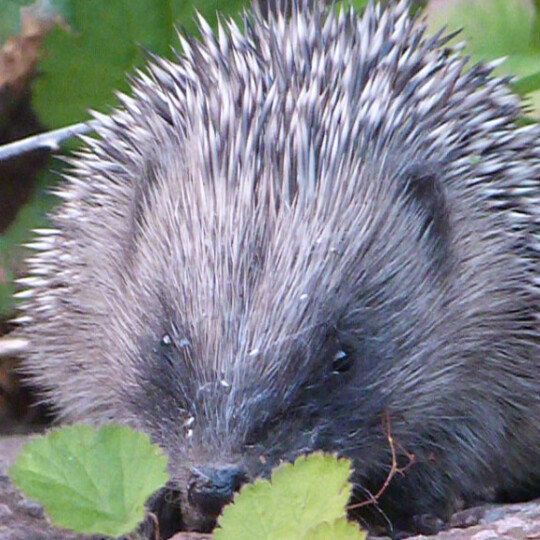This Hedgehog was foraging for food in our garden one late afternoon in July. You don't often spot hedgehogs in the day but this one was quite happy rootling about.
- YouTubeHedgehogs are nocturnal animals and generally their being out in the daytime could mean there is something wrong. However, it is important to use your judgement on whether or not to intervene. .
Hedgehogs that need help are:
- Orphaned hoglets - found out of the nest in day, the nest has been destroyed or the mother killed or injured
- Injured hedgehogs - with open wounds, fractures, bites, burns, or trapped in some way.
- Sick hedgehogs - usually found out in the day, thin, dehydrated, possibly poisoned, or with breathing problems.
- Hedgehogs that are unsteady on their feet (wobbling, rocking) or with flies around them.
- Autumn juveniles - young hedgehogs born late in the year, weighing under 600g from late October onwards - especially if out in the day.
Hedgehogs that should be left alone
- Healthy hedgehogs will often rouse from hibernation for short periods even in cold winter weather. Do not assume these hedgehogs need help unless they are underweight or obviously unwell.
- Adult females in summer that are uninjured but found out in daylight may be nursing mothers; the female will be the sole carer for the offspring, which could be up to five hoglets.
Often mother hedgehogs leave the nest to venture for food and if something happens to the mother, the hoglets will venture out of the nest in the search for food and end up at a rescue centre.
- Any large uninjured hedgehogs found at night, in winter or in the road and picked up should be put back away from the road but near where found.
- Late born summer babies are sometimes seen out and about trying to gain weight for hibernating.
A hedgehog will know its surroundings and be quite familiar with the same route it follows, and visit the same gardens each night, at the same time, so never move a hedgehog unless it is absolutely necessary and if in doubt contact a local rescue.
What do Hedgehogs eat?
They eat beetles, caterpillars, earthworms, snails, general garden insects, they do eat slugs but not a great deal, however slugs can give hedgehog’s lungworm, which can kill them if not treated.
Can I feed the Hedgehog in our garden?
If you want to feed them, an idea is to leave a shallow dish of fresh water. To eat, offer cat biscuits or wet cat food (meat in jelly). You can buy special hedgehog food if you wish, but the cat food and water is all they need to supplement their natural diet.
If there are cats in the area, try feeding hedgehogs inside a hedgehog house or feeding station that will allow the hedgehog access but not the cats.
What NOT to feed Hedgehogs.
There are food items that the hedgehogs really should not be fed. Traditionally, it was thought putting bread & milk out for a hedgehog was correct but if someone told you to do this today, do think again!
Bread - swells in the body and causes blockages in the hedgehog’s digestive system.
Milk - hedgehogs are lactose intolerant.
Dried fruit is not great as it can lead to tooth decay
Mealworms - keep to small amounts. Your hedgehog may appear to love them but mealworm in big doses can lead to metabolic bone disease.
Hibernation
Hedgehogs will hibernate anytime from around November when the natural food sources have reduced. Always remember to check bonfire piles for hibernating hedgehogs.
Most hedgehogs will move at least once during the hibernation season, so may been seen then or appear in a pile of leaves you previously checked..
See more garden visitors at the UK Nature Gifts YouTube channel

